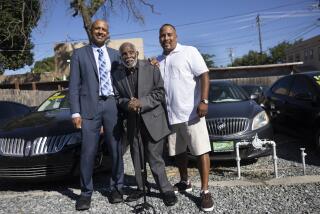BENDING THE LAW
- Share via
For a New York assistant district attorney, author David Heilbroner (“Rough Justice,” Aug. 26) is extremely naive and idealistic. His major complaint is that the current judicial practices of “keeping the cases moving” and “bending the law” gets in the way of justice.
In reality, such practices often have the opposite effect, actually helping to promote justice. The steady moving of cases through the judicial system not only results in more convictions and puts criminals behind bars more quickly (through plea bargaining, etc.) but also forces attorneys to prioritize cases and concentrate on the more serious ones. The alternative is a neve-ending backlog of judicial cases, which may cause the cases of hardened criminals to get lost in the shuffle or for innocent people to be imprisoned for years before going to trial (such as in the McMartin Preschool case).
Also, sometimes bending the law (i.e., illegal searches, seizures, arrests) is necessary in order to give hardened criminals their just desserts. Habitual criminals are often very clever and street-wise, and know the ins and outs of the criminal justice system better than some lawyers. As a result, it is sometimes difficult to convict them without occasionally resorting to somewhat deceitful methods. Besides, what better serves justice: giving a habitual criminal the punishment he rightfully deserves or having him get off on some legal technicality?
Abiding by the law and implementing justice aren’t always the same thing, and may sometimes be in conflict with one another.
KENNETH C. ZIMMERMAN
CYPRESS
More to Read
Sign up for Essential California
The most important California stories and recommendations in your inbox every morning.
You may occasionally receive promotional content from the Los Angeles Times.













